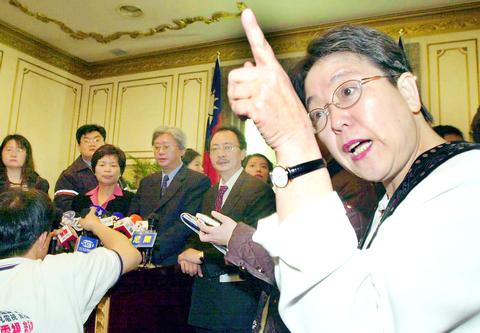Opposition lawmakers yesterday blocked a DPP attempt to make the enactment of a referendum law a priority issue on the legislative agenda.
The opposition fears that a plan to hold a referendum during the year-end legislative race has become a DPP tactic to drag out the Fourth Nuclear Power Plant (

PHOTO: CHIANG YING-YING, TAIPEI TIMES
Legislative Yuan speaker Wang Jin-pyng (王金平), who hosted yesterday's inter-party negotiations, said the opposition unanimously concluded that the law should follow due legislative process like any other, which means that substantive negotiations should be conducted before it is submitted to the legislature for final consideration.
"We are not going to single out the referendum law. All pieces of legislation get equal treatment. A bill can move on to the legislature when negotiations are complete," Wang said.
Following the Executive Yuan's announcement on Wednesday to resume the plant's construction, the opposition yesterday reopened the door to negotiations with the DPP, and the two parties held their first round of dialogue in more than three months.
The main purpose of yesterday's discussion was to arrange the agenda for the first meeting of the session on Feb. 20, when Premier Chang Chun-hsiung (張俊雄) will give the Cabinet's biannual policy address to the legislature. The legislature had refused to let Chang make the address last October, in protest over the Cabinet's decision to scrap the Fourth Nuclear Power Plant project.
But just as the tensions between the ruling and opposition parties are calming down, the referendum law is triggering a new conflict.
Opposition legislators considered the proposal by convener of the DPP legislative caucus Chou Po-lun (周伯倫) to prioritize the referendum law as a crude attempt to secure the support of anti-nuclear voters in the year-end election.
"We don't wish to see any political party use inter-party negotiations or even the legislature as a theater to vie for the year-end elections," said Hsieh Chi-ta (
A total of eight proposals for the referendum law, raised by different legislators, are now available in the legislature, some of which have finished a preliminary review. The Executive Yuan has so far not submitted any proposal to the legislature.
The opposition insisted that the referendum law should not be linked to the Fourth Nuclear Power Plant project, saying that otherwise political instability would continue.
"The referendum law should only apply to a public policy that has not been implemented. A project that is already underway, such as the Fourth Nuclear Power Plant, cannot be scrapped arbitrarily," KMT caucus whip Cheng Yung-chin (
Shen Chih-Hwei (沈智慧), deputy convener of the People First Party caucus, said the DPP should stop arguing about the power plant and focus its strength on revitalizing the nation's economy and improving the unemployment situation.
"With the dispute over the Fourth Nuclear Power Plant just concluded, [the DPP] is now trying other ways to ... provoke combat. We don't want to see this happen, nor do the people," Shen said.

US President Donald Trump yesterday announced sweeping "reciprocal tariffs" on US trading partners, including a 32 percent tax on goods from Taiwan that is set to take effect on Wednesday. At a Rose Garden event, Trump declared a 10 percent baseline tax on imports from all countries, with the White House saying it would take effect on Saturday. Countries with larger trade surpluses with the US would face higher duties beginning on Wednesday, including Taiwan (32 percent), China (34 percent), Japan (24 percent), South Korea (25 percent), Vietnam (46 percent) and Thailand (36 percent). Canada and Mexico, the two largest US trading

ACTION PLAN: Taiwan would expand procurement from the US and encourage more companies to invest in the US to deepen bilateral cooperation, Lai said The government would not impose reciprocal tariffs in retaliation against US levies, President William Lai (賴清德) said yesterday, as he announced five strategies to address the issue, including pledging to increase Taiwanese companies’ investments in the US. Lai has in the past few days met with administrative and national security officials, as well as representatives from various industries, to explore countermeasures after US President Donald Trump on Wednesday last week announced a 32 percent duty on Taiwanese imports. In a video released yesterday evening, Lai said that Taiwan would not retaliate against the US with higher tariffs and Taiwanese companies’ commitments to

‘SPECIAL CHANNEL’: Taipei’s most important tasks are to stabilize industries affected by Trump’s trade tariffs and keep negotiations with Washington open, a source said National Security Council Secretary-General Joseph Wu (吳釗燮) arrived in the US for talks with US President Donald Trump’s administration, a source familiar with the matter said on Friday. Wu was leading a delegation for a meeting known as the “special channel,” the Financial Times reported earlier. It marked Trump’s first use of the channel since returning to the White House on Jan. 20. Citing a source familiar with the matter, the Financial Times reported that Minister of Foreign Affairs Lin Chia-lung (林佳龍) was also a part of the delegation. The visit came days after China concluded war games around Taiwan and amid Trump’s

CHIP EXCEPTION: An official said that an exception for Taiwanese semiconductors would have a limited effect, as most are packaged in third nations before being sold The Executive Yuan yesterday decried US President Donald Trump’s 32 percent tariff on Taiwanese goods announced hours earlier as “unfair,” saying it would lodge a representation with Washington. The Cabinet in a statement described the pledged US tariffs, expected to take effect on Wednesday next week, as “deeply unreasonable” and “highly regrettable.” Cabinet spokeswoman Michelle Lee (李慧芝) said that the government would “lodge a solemn representation” with the US Trade Representative and continue negotiating with Washington to “ensure the interests of our nation and industries.” Trump at a news conference in Washington on Wednesday announced a 10 percent baseline tariff on most goods